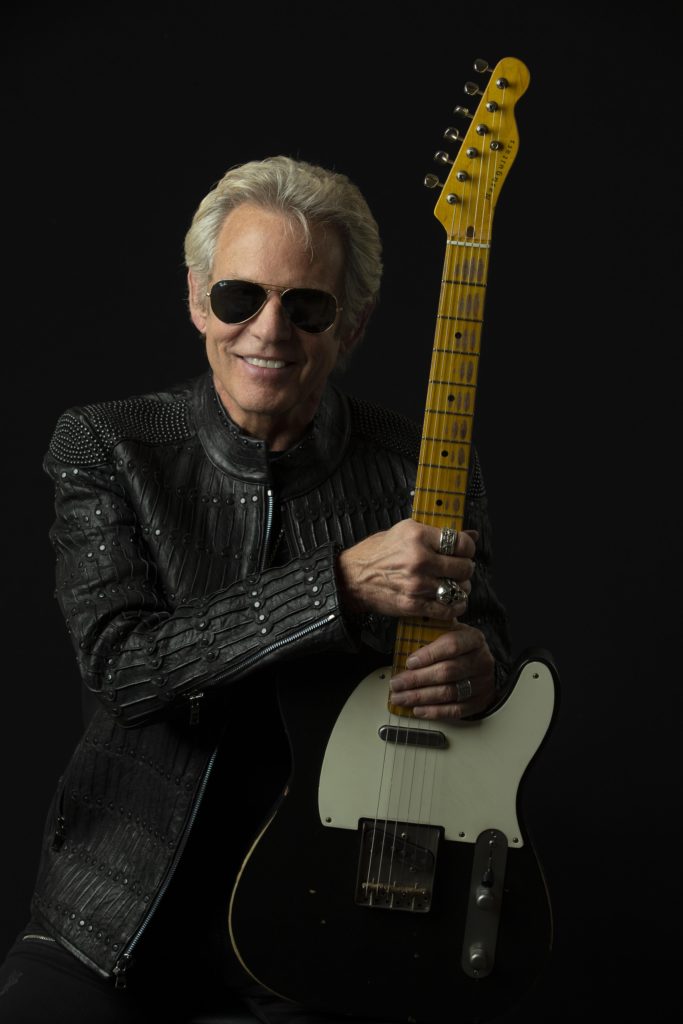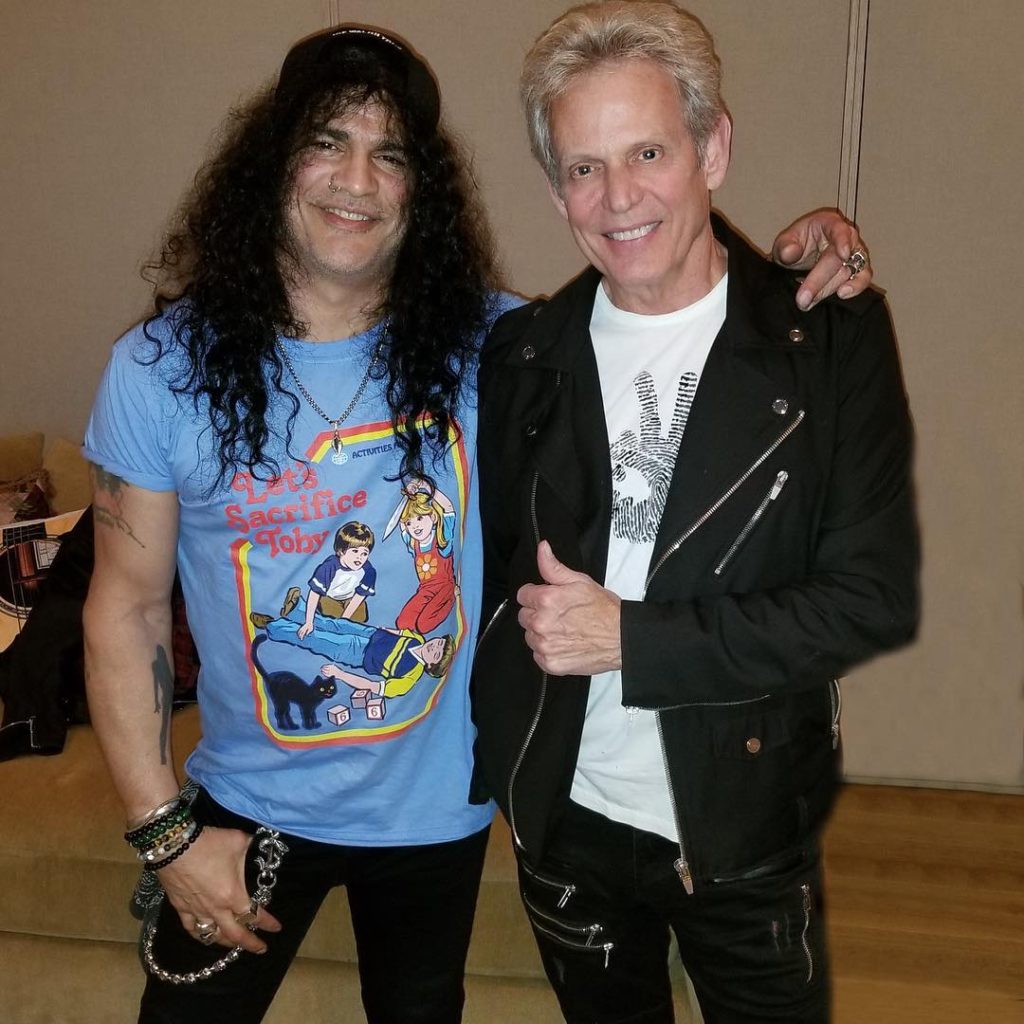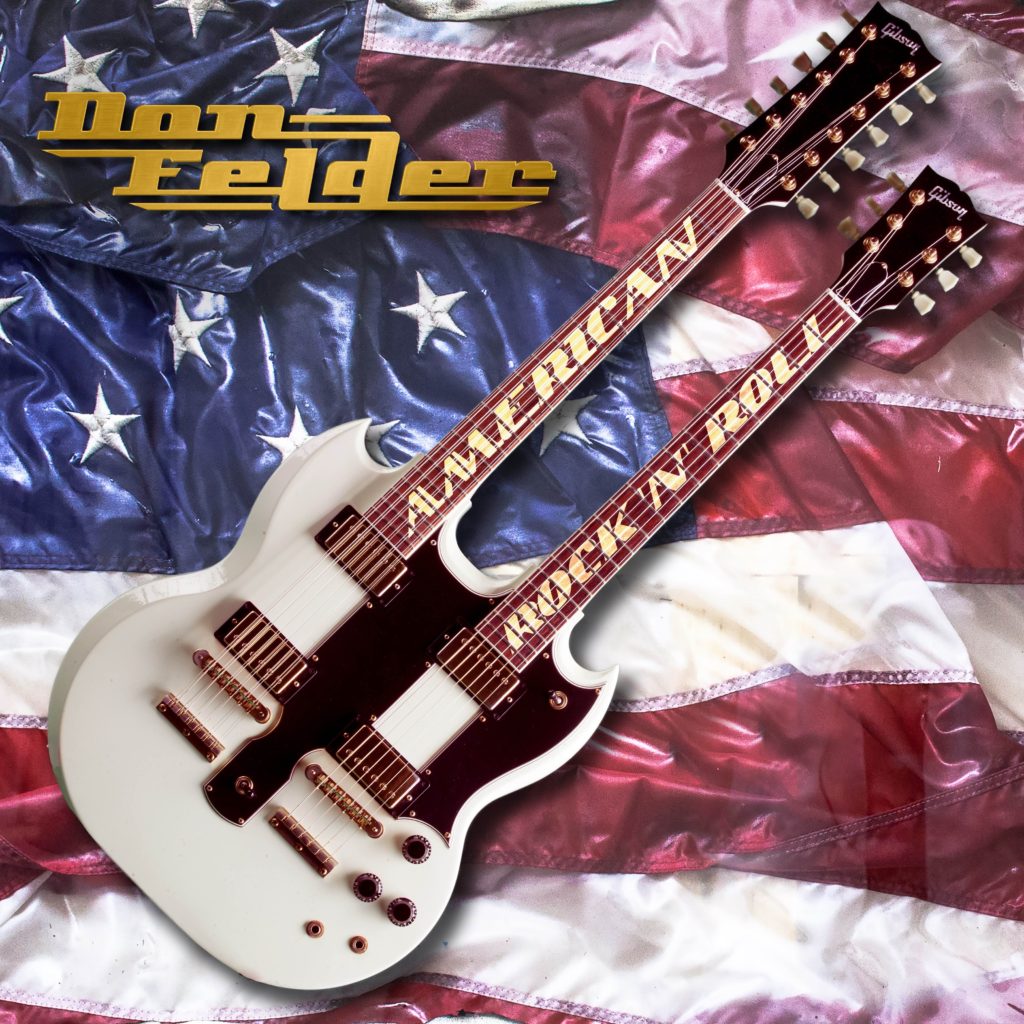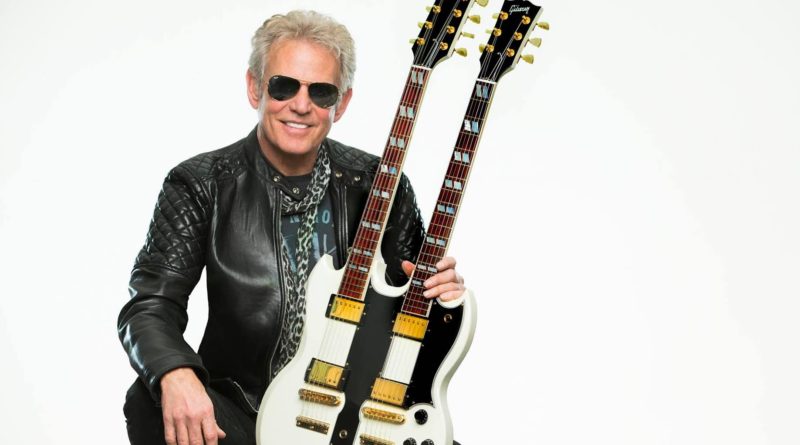The Rock Who Keeps Rolling: A Conversation With Don Felder
Don Felder, the legendary singer/songwriter and former guitarist 0f the Eagles, celebrated the release of his second solo album, “American Rock ’N’ Roll,” in typical Felder fashion — on the road and for his fans.
While the energetic and upbeat 71-year-old could comfortably sit back and rest on his laurels and spoils of decades past, having been a part of one of the world’s largest and most successful bands in the history of rock n’ roll, he hasn’t. And won’t. That’s not him. For Felder, music is his faithful partner that has done him no wrong, and he’s not about to end that relationship anytime soon.
“I love music,” Felder said in a recent phone interview with ListenIowa. “It never cheated on me; it never abandoned me. I don’t have to go out there and work anymore, but I just love to make music, and I love to make people happy. Playing music makes me happy, and me playing music makes the audience happy. It’s a win-win.”
The Rock and Roll Hall of Fame inductee is known worldwide for his fluid and melodic guitar playing on such classic Eagles tracks as “Already Gone,” “One of These Nights” and “Take It to the Limit.” His songwriting abilities are forever etched in time, too, with his creations “Victim of Love,” “Those Shoes,” and, of course, the epic “Hotel California.” Felder spent 27 years with the Eagles, and was a part of recording the top-selling album of all time — “Greatest Hits (1971-1975)”, which has sold more than 38 million copies.
But Felder is his own man now, and although he dips into the Eagles catalog he helped create during his current solo live performances, his focus these days is his music, which includes “American Rock ’N’ Roll,” the follow up to 2012’s, “Road To Forever.”
The album features 11 new songs from Felder and boasts an impressive guest list of contributing musicians including Sammy Hagar (“Rock You”), Slash (“American Rock ’N’ Roll”), Richie Sambora and Orianthi (“Limelight”), Peter Frampton (“The Way Things Have to Be”), Joe Satriani ( “Rock You”), Mick Fleetwood and Chad Smith (“American Rock ’N’ Roll”), Bob Weir ( “Rock You”), David Paich (“Hearts on Fire,” “The Way Things Have to Be”), Steve Porcaro (“Falling in Love”), Alex Lifeson (“Charmed”), and more.
His exuberance surrounding his new creation is palpable. For fans of the still-nimble-fingered Felder, it’s also a sign that his rock and roll road trip is far from over.
ListenIowa caught up with Felder recently to talk about the new album, putting together the iconic “Hotel California” guitar solos, and his advice to young musicians.
ListenIowa: Congratulations on the release of your new solo album, “American Rock ’N’ Roll.” What was the game plan — if you had one — heading into this album?
Don Felder: On my last record, I played guitar on every track except one, where Steve Lukather (Toto) played. I played every electric guitar, every slide guitar, acoustic guitar, dulcimer, banjo, everything. I did it all myself. I was happy with the way I was able to put that together, but at the same time I thought it lacked a lot of the spontaneity you get by sitting down with somebody like a Joe Satriani, who is an awesome talent. Same thing with Richie Sambora and Orianthi. We went to his house and wrote those solos. Orianthi came walking down the staircase, and I had forgotten that they we together. So I said, “Orianthi, you’ve got to grab a guitar and come play on this record.” I think she had just gotten up. She had shorts, a T-shirt and a baseball hat on, but she grabbed this guitar, plugged it in, and just killed it. Just absolutely blew me away. I had played with her before when she was on tour with Alice Cooper. She would come out and play with me on the solos on “Hotel California” at charity events that we were doing together. I literally just bumped into in going over to Richie’s to get him on the record and ended up getting her on the record, too. So there’s an excitement there, you know?
LI: Absolutely.
DF: I had a massive palette of talent to choose from. What guitar player would be the best for this song? Or what drummer would be the best for this other song? There are a bunch of drummers on this record, like Mick Fleetwood, Chad Smith, Todd Sucherman from Styx, and so on. They all have their own style and sound. Picking the right one for the right track was fun. It was different in that my last record had the same rhythm section except for one song. It was nice to have different sounds and feels and tones.
LI: In working with outside artists, do you make it a point to keep up with what they’ve been doing musically?
DF: I don’t listen to other music when I’m writing. A lot of people do the exact opposite and go out and listen to current music, hits and ideas that are on the radio right now. It takes me about two years with each project from the time I start it, record, mix, master, and get it out. If I had been listening to music when I was writing two years ago, it would be dated. And you listen to other music, and then two weeks later you have this great idea and realize, “Wait a minute. That sounds like John Mayer. I was just listening to him.” You get these subtle, underlying influences. When I’m writing, I don’t listen to anything, but when I’m not, I do listen to a variety of not only what’s happening right now, but also artists who are triple threats — artists who write, sing and play their own music. You can be a great singer, but then you have to rely on guitar players to make you sound good. Or you can be a great guitar player and have to rely on a great singer and someone else to write the songs. I have the ultimate respect for the artists who are able to write, sing and play. I think that’s what makes a long range career that has legs. You’re not reliant on someone. John Mayer is a triple threat. Alicia Keys is that way. She’s sort of an Aretha Franklin of the 21st century. She can go on writing and singing and playing for decades. Her voice is spectacular, and her writing is great. Gary Clarke Jr. is one of the new versions of Jimi Hendrix. He’s self-contained and has a unique identity in that form.
LI: Speaking of icons, you got Slash on the record in “American Rock ’N’ Roll.”
DF: I’ve known Slash, and we’ve hung out and done some charity events together. In the song, the next to the last verse, it talks about Guns N’ Roses, and Slash and Rose. I thought if I could get Slash in and just play a few licks it would be really cool. He lives just down the street, so we reached out to him, and he came over a couple of days later when he was back in town. He walked over to a guitar, plugged in to one of my Marshall amps, and made about five or six passes in that one verse. It sounded so good, so I told him to go back to the top of the song and play it head to toe so all the verses would be the same. Then I could go in and edit whatever he had done and place it anywhere. So we did a bunch of takes, then creatively edited it, made some room for me to play and answer some of his stuff so I would be playing on my own record, too. (laughs)
LI: “Little Latin Lover” is you on an acoustic guitar playing flamenco style, which shows another side of your playing that we don’t get to hear much, but is very good.
DF: Thank you. The last time I was able to play a nylon-string guitar on a record was the re-arrangement of “Hotel California” for the “Hell Freezes Over” video. I had spent a lot of time sitting at a Holiday Inn restaurant in Harvard Square when I was living in Boston, playing nylon string while people were eating their dinner, ordering more wine. So I built some skills on that. It’s a whole different beast than playing regular guitar. I really wanted to be able to do something that gave me some room to play nylon string on this new record, so I came up with this idea when I was down in Buenos Aires. A friend of mine who had taken me down there was dating this tango instructor. Beautiful gal. She took us to this tango parlor, which was like a giant oval, sort of like a hockey rink, but not quite that big. Along the side of it were all of these tables where people were sitting, drinking and talking to women, and going around this oval were people doing the tango. It’s just like a tango dance club. I was sitting there watching women come by, and their skirts flipping as they were turned around. Such elegance and sophistication; t’s like a Latin ballet, but much more sensuous and romantic. I wrote that song from the impression that it made on me.
LI: Another track,“The Way Things Have To Be,” features Peter Frampton, who announced his farewell tour recently after having been diagnosed with Inclusion-Body Myositis (IBM). It was good to hear him on the album.
DF: Peter and I did a bunch of shows together for his Frampton’s Guitar Circus. He’d come out and play “Pride and Joy,” “Hotel California,” and a bunch of other songs that I would do in the set with his band. We became really good friends. He called me up not long after that and asked if I would induct him into the Musicians Hall of Fame in Nashville. I was more than honored to do that. A year later, they asked if it would be OK if they inducted me into the Musicians Hall of Fame, and if so, who would I like to induct me? So I told them I thought I had an idea of someone who owes me a favor. (laughs) So he did. I wrote “The Way Things Have To Be” on piano. I’m not a great pianist, but that was a song idea that I’d been tinkering with that went way back before “One Of These Nights.” I finally decided I was going to finish it. Thank God David Page played the piano on the recording of it and replaced my sort of “claw” version of it. (laughs) But the whole time I was recording it, I kept hearing that Peter Frampton sort of sound, playing a Les Paul or Telecaster through this Leslie speaker. It has this angelic, unique, sort of ethereal tone about it. I flew to Nashville, and after a couple of hours in his studio telling jokes and laughing and having a good time, he did the guitar part. He actually did another couple of guitar parts and sang on the chorus with me, too. That was a couple of years ago. He most likely knew at time what his diagnosis was, but you would have never known. He was always smiling and happy and cheery and bright. I don’t think I’ve ever seen him without a smile on his face. He’s the most positive guy I’ve ever met in the music business. When I learned of his condition, I thought it was almost tragically ironic that I had him play on that one ballad called “The Way Things Have To Be.”
LI: You’ve touched on “Hotel California” a couple of times, a song that is virtually ingrained in every music lover’s mind in nearly every facet, including the guitar solos. Anyone can whistle them. You being the primary writer of the song and guitar player, how much thought and time did you put into making sure that the solo sections in “Hotel” were absolutely right?
DF: I don’t remember exactly, because it was almost 45 years ago, but I know that Joe (Walsh) and I spent a lot of time working out the solos, especially the harmony parts. It must have been two or three days of sitting in the studio, recording those harmony parts at the very end, bar by bar. Short little phrases, because we would work out one chord on it, and then when it changed to the next chord, we’d have to figure out what the harmonies were over that chord, and on and on. It was really hard, the first time, to do that and learn how to play it from the beginning to the end of that progression. So we did short little recordings until we got the bar correct, and then we went onto the next one and would play it together and punch in for that bar. We’d get two bars right, then move on to the next. It was a bit of a process. At the time it seemed incredibly tedious, but in hindsight, what we did was make something very perfect. I’m very proud of what Joe and I did.
LI: Collectively, there was an immense amount of talent in the Eagles. When it took a different turn, do you think it was a result of there maybe being too many chefs in the kitchen, so to speak? Something had to give.
DF: I don’t know what it was to tell you the truth. Like you said, there was an enormous amount of talent involved in the writing, recording, producing, singing. We had a strong arsenal in every suit. The guitar and background harmony vocals, in lead vocals, lyrics. As a band, when we played together, we were very tight. Everybody could write, sing and play. It was a unique combination to have five people who all can write, play well, and all sing. There’s bound to be a lot of great things to come out of a combination like that. That’s the way I like to remember it. We did an incredible job with the talent we had, and I was very fortunate to have been a part of a very magical combination of people and talent.
LI: Do you see yourself sharing a stage with those guys at any point, or has that ship sailed?
DF: Next question. (laughs)
LI: Got it. (laughs) You’ve been through a number of peaks and valleys in your career in the business. What would you tell a wide-eyed, young musician who, like you many years ago, is looking to make a career as a musician?
DF: The first thing I would say is that the person needs to sit down and think about why he or she is doing this. If you’re doing it with dreams of fortune, fame, worldwide recognition, success, you’re doing it for the wrong reason. If you’re doing it because it doesn’t matter if you’re playing in a bar or a casino for 2,000 people or on a stage for 100,000 people in a stadium, and it’s bringing you the same amount of joy and happiness, where all you care about is the music, then that’s what you should do. To me, that’s true for any walk of life. If you’re doing something in life that you’re not completely joyous with, and it’s not bringing you a lot of love and satisfaction, you’re doing the wrong thing. People never sit down and determine what it is they want to do with their lives to bring them the joy and love and success and satisfaction, despite the money. There’s a song on the new record called “Charmed,” and it’s about when you get the point where you have a fast sports car, a big house in Beverly Hills, a private jet, people hanging on your arms and all the trappings of success. But if the music doesn’t have passion, it’s all lost its charm. It’s like old toys you don’t want to play with anymore. It’s not about the toys; it’s not about the money. It’s not about the fame and the recognition; it’s about the music. If you’re doing it because of anything other than that, don’t do it. You’ll just be disappointed.
www.facebook.com/donfeldermusic
www.twitter.com/donfelder
www.instagram.com/donfeldermusic


